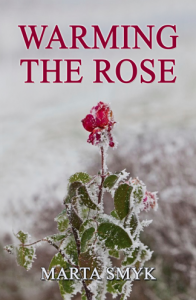 When a distracted gardener leaves Anastasia, the most beloved rose in the garden, uncovered and exposed to freezing temperatures, Anastasia’s fellow flowers must come to her rescue in this charming children’s story of friendship, bravery, and the power of hope.
When a distracted gardener leaves Anastasia, the most beloved rose in the garden, uncovered and exposed to freezing temperatures, Anastasia’s fellow flowers must come to her rescue in this charming children’s story of friendship, bravery, and the power of hope.
Amadeus, the hero of this tale, is both inspiring and engaging. The book is filled with many other strong characters as well, including Grandmother Rose, the wise matriarch of the garden; Mr. Black, a kindly raven; and two spunky companions: a meadow daisy and a nervous narcissus flower whom Amadeus meets on his journey to find a medicine that will save Anastasia. The flowers, with the exception of the unfortunate Anastasia, who is frozen in place, are able to leave the garden and ambulate at will, scurrying back to their roots when they hear the gardener approaching.
Some aspects of the story are a little confusing. For example, it is not at all clear why, if the flowers can run around and move objects and so on, they were not able to stash Anastasia in the shed the night the freeze came. Also, it is winter in the garden when Amadeus leaves on his journey, but seems to be summer everywhere else. The odd shifts of season may have been a subtle part of the allegory, or I may have missed some kind of explanation, but I suspect that if I was confused, young readers will be as well. However, I doubt any of this will be problematic for them as they follow the adventures of Amadeus as he risks life and leaf to save his friend.
Adult readers might enjoy the literary allusions in the text. For example, Amadeus quotes an ode by poet Samuel Foliage, and his favorite playwright is William Silver Spear. A famous line from Twelfth Night is adapted by Lucy, the daisy, as “. . . some of us are born prudent, some of us are born into prudence and some of us have prudence thrust upon us.”
The slightly old-fashioned diction and flowery language suit this story nicely. However the many clichés and incorrect word choices (such as “baited” for “bated,” “bear” for “bare,” “measly mouthed” for “mealy-mouthed”) are distracting and might be misleading for young readers. This book would probably be best read aloud. Despite these occasional blunders, Smyk’s language really sings in places. A sewer is described as “a vast cathedral of stench.” I imagine that even William Silver Spear would like that.
Smyk takes on some class issues, working the social differences between weeds and pampered garden roses into the story. She does this with a light hand so that it adds depth and thoughtfulness without coming across as overly didactic.
Amadeus may have a little too much luck on his side when he is in the worst of his jams, but the story maintains a nice balance between tension and camaraderie among the characters. There is also a nice balance between suspense and action as the story moves from crisis to resolution. The plot and the characters are exactly what you expect from this type of story. I expect that young children will be delighted, older ones entertained, and adults amused as they follow Amadeus and his companions on their quest to save Anastasia.
Links
Smashwords
Get an Editorial Review | Get Amazon Sales & Reviews | Get Edited | Get Beta Readers | Enter the SPR Book Awards | Other Marketing Services






















Leave A Comment